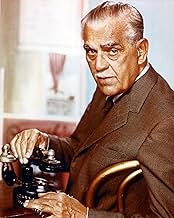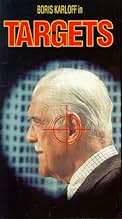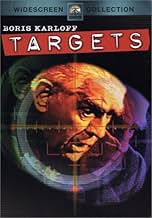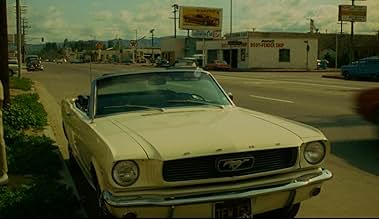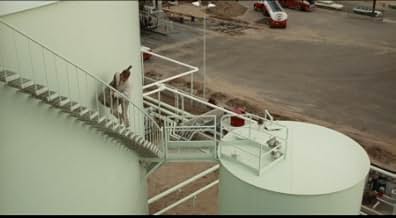An aging horror star contemplates retirement amid the modern culture of random violence, while a disturbed young gun collector embarks on an unprovoked killing spree.An aging horror star contemplates retirement amid the modern culture of random violence, while a disturbed young gun collector embarks on an unprovoked killing spree.An aging horror star contemplates retirement amid the modern culture of random violence, while a disturbed young gun collector embarks on an unprovoked killing spree.
- Awards
- 1 win total
- Marshall Smith
- (as Monty Landis)
- Waiter
- (as Tim Burns)
Storyline
Did you know
- TriviaRoger Corman told director Peter Bogdanovich that he could make any film that he wanted to, on two conditions: he had to use stock footage from the film The Terror (1963), and he had to hire Boris Karloff for two days (Karloff was under contract to Corman and owed him those two days). Karloff was so impressed with the film's script, however, that he refused any pay for any shooting time over his contracted two days. He worked for a total of five days on it.
- GoofsBobby's check to the gun shop is dated late July, but when Orlok picks up a newspaper story about the supermarket massacre several days later, the paper carries a March date.
- Quotes
Byron Orlok: Ladies and gentlemen, boys and girls, I'd like to leave you with a little story to think about as you drive home - through the darkness. Once upon a time, many years ago - there should be a pin spot on my face as I'm talking - once upon a time, many, many years ago, a rich merchant in Baghdad sent his servant to the marketplace to buy provisions. And after a while, the servant came back, white-faced and trembling, and said, "Master, when I was in the marketplace, I was jostled by a woman in the crowd, and I turned to look, and I saw that it was Death that jostled me. And she looked at me and made a threatening gesture. Oh, Master, please, lend me your horse, that I may ride away from this city and escape my fate. I will ride to Samara, and Death will not find me there." So the merchant loaned him the horse, and the servant mounted it and dug his spurs into its flank, and as fast as the horse could gallop, he rode towards Samara. Then the merchant went to the marketplace, and he saw Death standing in the crowd, and he said to her, "Why did you make a threatening gesture to my servant when you saw him this morning?" And Death said, "I made no threatening gesture. That was only a start of surprise. I was astonished to see him here in Baghdad, for I have an appointment with him tonight in Samara."
- Crazy creditsThe film's original theatrical prints began with a written title card that read, "Why gun control? Why did a lunatic sniper kill or maim 11 innocent victims in Texas on June 3, 1966? Why were over 7,000 Americans slain or wounded by gunfire in 1967? Why in 1968 after assassinations and thousands of more murders has our country no effective gun control law? This motion picture tells a story that sheds a little light on a very dark and a very deep topic." This title card was added by Paramount Pictures only as a result of the then-recent assassinations of both Doctor Martin Luther King and Senator Robert F. Kennedy, but it was not approved by the film's director, Peter Bogdanovich at all and, as a result of this, it was removed from all later releases of the film, including those for home video.
- Alternate versionsThe film was cut for a "GP" rating only once, mainly for a 1971 re-release of it in order to capitalize on the success of Peter Bogdanovich's then-recent hit film, The Last Picture Show (1971). Later releases of it on home video were all uncut.
- ConnectionsFeatured in 100 Years of Horror: Boris Karloff (1996)
- SoundtracksGreen Rocky Road
(uncredited)
Written and performed by The Daily Flash (Don MacAllister, Steve Lalor, Jon Keliehor and Doug Hastings)
As usual when it comes to Roger Corman productions, the story behind the film is just as interesting (often more so) as the film itself. Karloff apparently owed Corman a couple of days work, so he was handed to Corman protégé Peter Bogdanovich, and told him to make whatever film he liked - as long as it was cheap, quick, included footage of his film The Terror (1963), and drew on the recent Charles Whitman killings. So, with the help of screenwriter Samuel Fuller, Bogdanovich crafted an intelligent, shocking, and extremely interesting film that what way ahead of its time.
Targets is many things. On one hand it is a warm love-letter to the legendary actors of old. In one scene, Michaels enters Orlock's hotel room, them both being drunk, and watch the end of Howard Hawks' The Criminal Code (1931), which starred a younger Boris Karloff. They briefly discuss the genius of Hawks and Michaels comments on what a fine screen presence Orlock (really Karloff) was, and still is. It is also a first-rate thriller. Tim O'Kelly is very effective as the clean-cut, all-American boy, who is becoming increasingly shaken about the person he finds himself becoming. In real-life, Whitman was found to have an aggressive brain tumour that was believed to be the cause of the sudden killing spree. The violence, though not gratuitous or exploitative, is shocking and nasty. The murder scenes are shot with a slow and detailed precision that are scary given the real-life occurrences.
Most interestingly, the film is a commentary on the generation gap, in both society and in cinema. Michaels states that "all the great films have already been made." Of course, this is not true - America was about to enter its true golden age, when the likes of Martin Scorsese, Steven Spielberg, George Lucas, Dennis Hopper, Francis Ford Coppola, Michael Cimino, and Bogdanovich himself shook Hollywood to its core. But Michaels is reflecting Orlock's fear of the new. Orlock is retiring because "it's a young person's world," and he feels he no longer has his place. The film builds up to the inevitable meeting of Orlock and Thompson - the old vs. the new, if you will.
Targets is quite hard to sum up. It is genuinely a hidden gem, and a true original that should be seen by anyone interested in cinema. Karloff would sadly pass away a year after this film was released, and he gives what is possibly his finest career performance. He has no scary make-up or sets to drown him out. He is simply an old man, walking stick and all. Although he made a couple more films after this, Targets seems his true and fitting exit from cinema. This is close to an 'A'-movie that I've seen a B-movie get, and again proves that Roger Corman was a true cinema genius.
www.the-wrath-of-blog.blogspot.com
- tomgillespie2002
- Nov 26, 2011
- Permalink
- How long is Targets?Powered by Alexa
Details
Box office
- Budget
- $130,000 (estimated)
Contribute to this page



